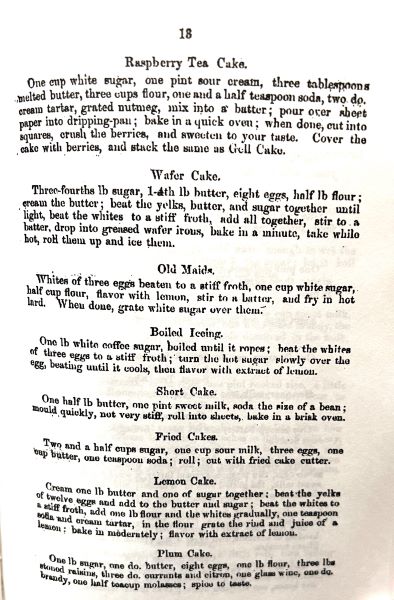
This year, recipe books and cards in the McClung Collection’s annual holiday cooking display feature Stella DeVault and Malinda Russell, local bakers who honed their culinary skills and business acumen during the days before the Civil War.
Stella DeVault’s popular holiday gingerbread and the tale of how she purchased herself from enslavement with money earned by selling it were once legendary in her corner of Southeastern Tennessee. James Wright of Monroe County (b. ca. 1855) remained as proud to tell the story of his grandmother as Stella herself had been to publicly display her bill of purchase on the wall of her shop kitchen. When the Knoxville Journal’s Cooking Contest featured gingerbread in 1933, Wright and Maggie Hammontree Magill, a Monroe County reporter, submitted Stella DeVault’s story and recipe. As she is not readily identified in census or other records, coverage of the contest might currently serve as the only surviving evidence which documents Stella’s existence.
Stella DeVault was probably born ca. 1800 and gained her freedom ca. 1825, likely at Athens in McMinn County. Washington County natives Jacob and Dorcas Pearson DeVault lived in Athens from approximately 1822 to 1828 and are the only DeVaults documented in the region during that period. Surviving records do not indicate they ever owned slaves. Gaining her freedom would have endowed Stella with the ability to identify herself by any surname she chose, and adopting a last name connected with someone who possibly helped her on the path to freedom may have appealed far more to Stella than the idea of carrying the name of people who had held her in bondage. Could Dorcas Pearson DeVault (1801-1861) have been significant to Stella?
The 1850 Census enumerates Jacob and Dorcas’ household beside “cake baker” Lovely Bunch, suggesting the DeVault family’s potential connection to two separate bakers may not be coincidental. Though the typical image of females involved in the culinary arts during this era is that of a home cook working in her family kitchen, a significant number of women with special culinary skills worked out of their homes in roles we would now recognize as bakers and caterers, or cooked in a professional capacity for restaurants, taverns, boarding houses and private homes. While her husband made a comfortable living as a blacksmith, it remains possible Dorcas DeVault was involved in commercial cookery, potentially bringing her into contact with other culinary professionals and presenting her with the opportunity to employ them or help market their wares.
Born to Karon Russell, a free mother of color at Freedom (now called Limestone) in Washington County, Malinda Russell left Tennessee at age 19, hoping to go to Liberia by way of Virginia. At that time, around 1850, the state of Virginia offered a $25 allotment for any one who wished to immigrate to Liberia, though that allotment turned out to be far less than a person needed to establish themselves in the West African nation. Finding herself unable to proceed due to lack of funds, Malinda remained in Virginia and learned the art of cookery from a fellow free woman of color named Fanny Steward.
After being married then widowed, Malinda returned to Tennessee. She initially operated a boarding house at Cold Springs on Chuckey Mountain, tucked into a far corner of the Greene/Cocke County/North Carolina border which was then popular with rusticators seeking healthful mountain air. Malinda eventually opened a bakery in the town of Greeneville, which she operated successfully for six years before the Civil War put an end to her business. A violent home invasion and robbery conducted by guerillas on the night of January 16, 1864, with the threat of more violence to come, drove Melinda and her son to seek relative safety alongside a Union unit traveling to Knoxville. Finding the city overcrowded and in the grips of a smallpox epidemic, the federal soldiers loaded their civilian charges on the first available train headed north, toward the large refugee camps surrounding Cincinnati. By 1866, she and her son had settled in the Detroit area. That May, Malinda entered the offices of the True Northerner, a Republican newspaper in the small Michigan village of PawPaw, and presented the owner with a business proposition: she would pay him to print a book of her recipes. T.O Ward accepted, and Malinda Russell’s A Domestic Cookbook was soon published.

Malinda began her book with an autobiographical introduction which provides practically all the information we know about her today. For a long while, though, even this information was lost. By the year 2000, the existence of Malinda Russell and her cookbook was largely forgotten, and Abby Fisher’s What Mrs. Fisher Knows About Old Southern Cooking (1881) had been considered the earliest cookbook by an American woman of color. Helen Evans Brown (1904-64), a mid-century celebrity in the field of West Coast cookery who helped create the concept of “California cuisine” and who may have been the last person with knowledge of Malinda or her cookbook, had been dead for the better part of four decades. Brown’s cookbook collection numbered over 10,000 volumes, and remained in her home until her husband’s death in 1995, when bookseller Janet Jarvits purchased it in its entirety. Another five years would pass before Jarvitz opened the box containing Melinda’s book and realized she might have something special. Melinda Russell’s A Domestic Cookbook (1866) re-emerged from the past and is now the earliest known cookbook written by an American woman of color.
The book was ultimately purchased by passionate cookbook collector Janice Bluestein Longone (1933-2022), and the volume formerly belonging to Helen Evans Brown, still the only surviving original copy currently known, now resides at the Janice Bluestein Longone Culinary Archive at the University of Michigan’s William L. Clements Library in Ann Arbor.
Research and writing by McClung Reference Librarian Danette Welch